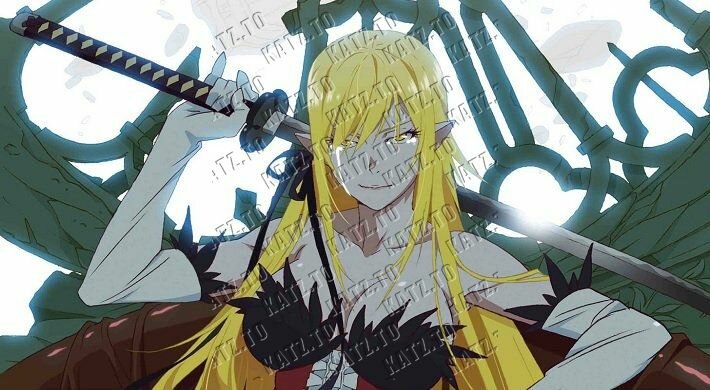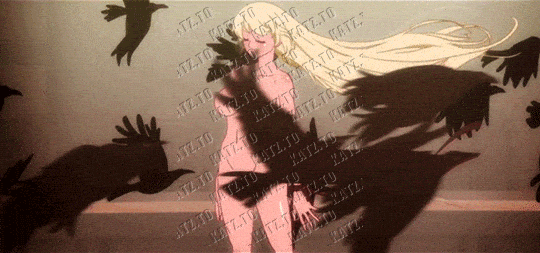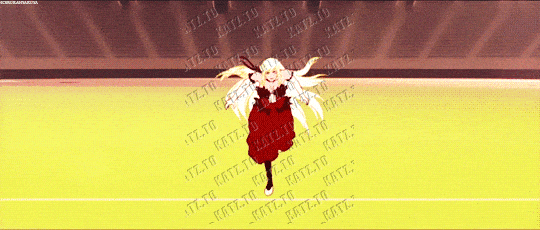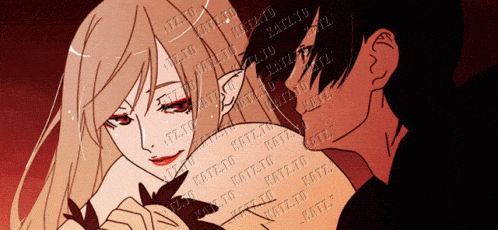- Joined
- Aug 24, 2023
- Messages
- 1,392
- Reaction score
- 30,192
- Points
- 113
- Location
- ꜱᴏᴠɪᴇᴛ ᴜɴɪᴏɴ [ᴜꜱꜱʀ]
- grants
- ₲23,536
1 years of service
- Thread Starter
- #1

SYNOPSIS
With help from Meme Oshino, the apparition specialist, Koyomi defeats the three powerful vampire hunters: Dramaturgy, Episode and Guillotinecutter. Koyomi takes back all the limbs of Kiss-Shot-Acerola-Orion-Heart-Underblade in order to become a human again. But, when he returns to Kiss-Shot, she reveals to him the cold truth of what it means to be a vampire—a creature of the night. Unable to take back what he has done, Koyomi feels nothing but regret and can only deny his dreadful fate. While Koyomi is struggling to face reality, his "friend" Tsubasa Hanekawa comes to him with a certain plan…

To start this off all the way to the right - this trilogy is a masterpiece. Many fans of the franchise will agree on the point of these films being a drastic stylistic departure from the TV show. It could even be noted that it's a prime example of using style as its substance - maximalist visuality - and swimming against the minimalistic precedent set by its TV counterpart. Kizumonogatari employs a visual language that lets its visual nuance speak as its consciousness. The use of a flexible blend of 2D animation, 3D rendered environments, and real-life photography makes the possibilities endless. It allows the animators to throw conceptually abstract sequences at the audience without it feeling out of place. The films could almost be described as Japanese Looney Toons, directed by Edgar Wright if he were working during the French New Wave era.
There is a clear contrast between the show and the films. Bakemonogatari opens with a rapid-fire editing montage that captures the events of Kizu as the first introduction to the series. Information is being used as ammunition and pummels the viewer in a quite bold manner. Kizu on the other hand, focuses its opening on long, lingering takes that try to establish a cohesive and coherent world - giving it a more cinematic feeling. Therefore, the breathing room makes it easier for the audience to feel with the characters, rather than for them. It becomes more emotionally relatable, in a sense. One of the biggest pulls in its visual grammar is the use of 3D animation as the backdrop. The TV show uses loosely animated 2D backdrops which work well, and many have used this as a central critique of this trilogy. It's a fair point - but one I'm personally in disagreement with. The mix of 3D and 2D created some of the most unique and dynamic sequences I think I've ever seen - even if it sometimes looks like Playstation 1 graphics. 2D drawings and characters all look even better than in the show, and their movement in the fight scenes especially is a beauty to behold - many thanks to the amount of budget saved on the use of 3D.
Monogatari has always been a satire on many genres that amplifies its protagonist’s desires for everyone he encounters. Sex, laziness, and social incompetence are present traits that most characters possess - one way or another. The central use of vampires in the narrative fits the sexual undertones very well, as the story can explore various kinds of intercourse without fully committing or going overboard. Being bitten, the bite marks themselves, and drinking blood are all quite fitting innuendos. Araragi's literal transformation is a perfect allegory for a coming-of-age story. It also allows the story to tackle existential themes in a horror-esque fashion without feeling contrived. Bunny-hopping over horror, comedy, and drama - every scene is trained to bring surprises and as a result, offers a clinically deprived story - for better or worse depending on who you ask.
Kizu is creative expressionism in every sense of the word. Whether you enjoy its style is very much dependent on you. It captures a familiar coming-of-age narrative through the use of blood, lust, and superstition - playing into the horrors of navigating through young adult life. Its comedic insanity, brutal gore, and hornier-than-thou approach are matched by a surgically assured sense of freedom. As problematic of a character as he is, Araragi is so superbly developed, and his arc is masterfully woven into the story. A world so creatively weird and different as this will always draw me in, which is why I think it’s a masterpiece - in the most subjectively objective way possible.

The way that this movie experimented with the unreliable narrator elements that have always been big in Monogatari was nothing short of brilliant. The obvious bit is the lack of Araragi's internal monologue. The narrator's thoughts have always been the driving pulse of the series, and because of them we see the world differently through different people's eyes and learn that nobody is actually giving us an objective, 100% accurate view of what really happened. Removing that direct element of the narrative, as well as smaller details such as the wide, distant shots seen as if from a helicopter with the sound of the blades beating, make it feel like we're actually seeing events from outside a character's head for the first time.
But then the final lines of the movie destroy that impression. We hear the voice in Araragi's head for the first time, talking about how the story of Kizumonogatari is a dark, painful, unhappy one that he will never tell to anybody. And yet, once he finishes that internal monologue, he breaks the fourth wall by looking directly at the camera and smiling. It's a great moment of contrast; he's literally telling us that he's never going to tell us exactly what he just told us. And I think the smile indicates that he knows exactly how he's contradicting himself. I believe Araragi's parts of the story are all narrated from a point in time beyond the end of the series, when he's no longer the conflicted and fucked up teenager of Kizu but the mature, insightful adult we saw in Hanamonogatari. So while all that about never speaking of Kizu again was definitely how Araragi felt at the end of his spring break, the fact that he's saying those words to us now means that he doesn't feel that way any more. Now that he's grown up and gained some experience and perspective, he can look back on all this, the beginning of his connection with Shinobu, fondly and without having to relive the pain. It's a f-king brilliantly subtle way of showing just how much he changed over the course of that year.

Koyomi Araragi is in many ways the peak light novel protagonist. The mode of writing that this subgenre of fiction panders to is pretty uniform; the modern light novel is mass-produced in order to sell to teen and otaku audiences, after all, and could easily be accused of being an industry of exploitation more than it is any kind of artistic movement. Your stereotypical light novel will typically feature a relatively self-insert protagonist who attains some form of unique ability and falls in with a group of attractive and quirky female (and possibly male) peers. It's a formula you'll see a million times if you dive into the Japanese pop-culture landscape, and especially prevalent with a high school protagonist in a supernatural world. While this is admittedly a broad generalization, with most stories generally finding key distinguishing traits that will attempt to make them different from the crowd (setting, plot structure, "power system," etc...), the mode that Monogatari operates in is highly reflexive to the stereotype I've laid out here.
Nisio Isin, the author of the Monogatari series, is someone who is intensely aware of tropes and story structure. Most of his works will have at least a slight degree of subversiveness to them, and often, he will blow the core appeal of a story's given genre to their absolute limit to achieve his unique style. For example, in Bakemonogatari, Araragi is first introduced having already acquired vampiric abilities, before promptly falling into a new supernatural situation with 5 different girls, all while still attempting to keep up with his responsibilities as a high school student. Of course, the story doesn't play this totally straight, because Isin ramps up the nature of the story far beyond what one would conventionally expect.
Isin tells his stories through the perspective of his protagonists. For Monogatari, that means the story will usually be seen through Araragi's eyes. When considering that Araragi is a socially awkward and hopelessly horny teen, and that the story is going to amplify every potentially titillating aspect (sex, violence, pop culture asides, all of it!) for the sake of Isin's trope-bending, it's easy to see where the reputation it has garnered for itself was formed. Every character is framed through their sexual appeal to some degree, and the roundabout nature of the dialogue here often feels as if characters are speaking in tongues, because it's the most excessive way to communicate through a blueprint of fiction that encourages laziness. Yet, each character is given a remarkable amount of agency within the plot, and just about any sexual scenario is either done to define the power dynamics between the cast or to act as a kind of parody of the genre as a whole. Later arcs will even act as a total thematic inversion of past stories, flipping the script in order to highlight the relative insanity that taking Araragi and his worldview at face value would imply. The reason why the Monogatari series works is because it overcomes the worst aspects of it's peers, using legitimate intellect and extreme cheekiness to find a shocking level of sincerity beneath the veneer of showy genre play.
Kizumonogatari is the perfect demonstration of all this. Araragi's relationship to Hanekawa and Kiss-shot are both framed in intensely sexual ways; beyond the obvious degree to which he is sexually motivated to engage with them, the way that they exert power over him through their sexuality undermines the assumption of him accumulating a harem. Araragi is motivated by Kiss-shot from a very paternal perspective; , and the aging of Kiss-shot's character as she is restored to her former self is concurrent with the gradual erasure of this immaturity. When making the choice to keep Kiss-shot as a perpetual weakling, he is essentially babying her, depriving Kiss-shot of her independence as a consequence for her betrayal of his values. Although their bond will eventually be repaired to a degree, Araragi is shown to take a certain amount of joy in being able to exert control over a being that had cast so much doubt into his life, a bond that could easily be seen as bondage of sorts. Araragi's bond with her is seen to be highly codependent throughout the series, but Kizumonogatari makes it clear that he is assuming a degree of paternal instinct in how he treats her.
For Hanekawa, their mutual attraction becomes a continually escalating game of chicken through foreplay. Araragi constantly pushes his voyeuristic tendencies, with Hanekawa playing along thanks to a sense of attraction she mutually holds, with Hanekawa finally "winning" in the infamous gym scene; there's a massive degree of discomfort mined in the material, but it demonstrates that Araragi is immature in every sense of the word, with the joke squarely landing on him in the end. Note the head pat that Araragi is given after affirming his intentions to kill Kiss-shot, while we're at it; An inversion of the same gesture that twisted the assumed power dynamic of master-servant between Kiss-shot and Araragi, it makes clear that Araragi is just as malleable as he is domineering, a bizarre love-triangle of sorts cast through this dynamic. To put it more simply, Araragi is in Hanekawa's thrall for the desire to have her influence exerted onto him, just as he is under Kiss-shot's thrall in order to exert his power over her. The movies explore this dynamic in about as radical a way as possible, and could be seen as bordering on softcore pornography, but that's kind of the point; Araragi, a sexually confused teen thrust into an extreme situation of physical and emotional turmoil, is going to view the new dynamics of interpersonal power in the most overcharged way possible.
To this end, the use of vampires within the narrative is essential to appreciating the story at large, and not just as a basis for the plot to occur. The beauty of any genre fiction is how it can be warped and molded to fit a creator's needs, and vampires are one of the best examples of how to apply broad social commentary through the veneer of an easily recognizable symbol. Here, using vampiric powers as the impetus for the narrative accomplishes a few key goals. Firstly, it allows for the story to display a sort of intercourse without fully going all the way. The tools of vampiric fiction are ripe to be pared with sexuality, after all; bite marks = hickeys, blood exchange = fluid exchange, and the very literal act of being bitten could be coded as losing one's virginity. Secondly, the act of literal transformation that occurs in becoming a vampire can be extended to a more personal transformation; as Araragi embraces his vampiric abilities more fully, the transformation away from his original state allows him to literally become a new person. This is a very appropriate allegory for a coming-of-age story, where the experience the character undergoes will often leave them at a similar, but newly informed state. In Araragi's case, he's come to accept the value of his life and of his humanity, the literal transformation he underwent and rejected leaving a mark, but giving him the experience needed to become a more complete individual as a result. Finally, it allows for the story to engage in more abstract forms of horror through the ways with which it tests the conventions of vampirism. Immortality here is cast as an existential curse, with the characters either suffering in comically absurd ways by using violence as a means to an end, or by wasting away in emotional turmoil for eternity. Much of the film's most visceral emotion is cast by the warped mix of humor and horror with which it views it's world, denying the allure of vampiric fiction by intensifying the inhumanity that it embodies.
When all is said and done, Kizumonogatari offers a wholly unique and beautifully assured cinematic experience. It frames coming-of-age through blood, lust, and superstition, capturing the horror and uncertainty of finding your place in the world with the beauty of having others there to help guide you along the way. The comical insanity of these films is matched only by the genuine earnestness with which they operate, and the affection that the creators have for the world they have crafted is infectious. Araragi is especially well realized, all his hypocrisies and all the problems that he brings exposed for all to see. Love it or hate it, that's the story that's being told.
I may not connect with this quite as much as I did when I was entering my own senior year of high school, but that's okay. The abundance of talent and intelligence of the execution is always going to pull me in, long after the story has lost it's initial punch. In all honesty, I don't think I can ever stop loving a world as weird as what this series has to offer; for as challenging as it can be to be a fan of Monogatari at times, the bedrock of the world is founded on a layer of honest affection that I will never stop wanting to come back to. The marks that Monogatari will forever be a part of me, and I wouldn't have it any other way.
3 MOVIES (TRILOGY) POSTED! ENJOY WATCHING KATZMATES! HERE'S THE FULL REVIEW OF KIZUMONOGATARI [ TRILOGY FULL REVIEW I - III ]
please follow me if you like my post or give me reputations to motivate me to post more in the future
LEAVE A LIKE AND COMMENT THEN REFRESH TO SEE THE LINKS BELOW

